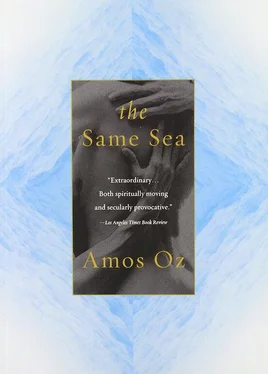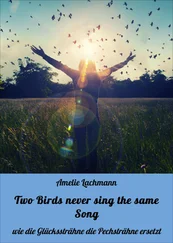for sunrise or sunset. Enough
that the sun brings its tray of gold
and the moon its tray of silver. I remember.
Grapes and an apple she gave me
in the summer holidays of '46.
I sprawled on the rush matting,
a fib-child. And in love.
From paper I used to cut her
flowers and blossoms. A skirt
she had, a brown one, like herself,
a bell and a smell of jasmine.
A soft-spoken woman. I touched
the hem of her dress. By chance.
What I wanted I didn't know
and what I knew still hurts.
What I knew still hurts. Nadia Danon, for instance: like my teacher Zelda
she too died of cancer. Despite the bird before dawn, despite embroidering
until two days before she died, despite Dr. Pinto mercifully drugging her,
a false hope deluded her. Struck roots inside her. Refused to let go.
The twilight of her suffering showed her a samurai in a china mask, who was
her first husband: a tall, stern, elegant man, who always knew what was right,
he would turn out the light, curl up, press her breast, burrow and fiddle
in her flesh, hurting her to the bone but in the end he always let go. Soon
he had had enough of her and she was saved. Not long now.
But what if anything would Giggy Ben-Gal say about all this? This story
is getting on his nerves, because the night is still young and there are
some juicy scenes still to come, women going down, shares going up
tonight he has plenty of tricks to turn. Tel Aviv is a big pond,
where he plays step by step, one move at a time.
Joking aside though, the bastard who laughs last laughs longest. In
less than a year he'll be number two in the firm,
and then he'll really hit the town, the sky is the limit
and the limit is just the first step . *Those bad scenes, like sickness
suffering and death, are strictly for the losers who are stuck on
the south side of town. Lonely people
deserve to live alone, and the needy deserve to be poor. Life
may or may not be a picnic but, on the other hand, even your Mr. Perfect
is really just another show-off. Everyone pisses and fucks so why should they
all pretend otherwise, that frustrated Narrator and the other old moralizers.
A short time before or after sunset this Narrator goes outside to check
what is going on and if there is any news in the desert. The wind
is always leaving: it always blows from there to there,
through here but never from here. A dust devil rises, dissolves and
re-forms on another hill. And disappears again. One move
at a time, he laughs last, the gospel according to Giggy Ben-Gal. Suffering
sickness and death come and go. Unlike this desert. Unlike the stars
in the sky. They are fixed. But this too is only apparent. Better a living dog,
and the poor mans wisdom is poor, a barren heath in the desert which the
wind stirs up then abandons. Always abandons. It comes from there and
drifts to there, it whirls around and returns into stillness. It is not the dead
who will see it, and sweet is the light to the eyes.
My hand on the latch of the window
Dear parents, dear Fania and Arie, it's night now and I'm in my room
in Arad, alone with my tea and these pages. The requiem is by Fauré. A fan
is whirring, blowing, turning away, coming back. The desert
is empty and near. At the windows the darkness is warm. And you
are both resting in peace. Are you sleeping? Or quarrelling still? At least
you can't fight over me: I'm tidy, hard-working, successful. Bringing you
more and more pride and joy, a regular sorcerer's apprentice. I'm tired
but I never give up. You both wanted me to grow up to be one thing
or another. Dad one thing and Mother another.
Now the difference is gradually shrinking. What difference does it make
what I am. I shall be here for a little while longer, and then I shall rest.
It's late. This street is empty and the garden is whispering to itself
in Russian, so I won't understand. It's mistaken: at this hour secrets
are less secret and almost all things are revealed. For years and years
Dad you stockpiled footnotes while you, Mother, stood at the window,
clutching your usual lemon tea, with your back to the room. Tormenting
yourself and longing like Elimelech the carpenter to return to some orchard
you'd dreamed up. Which never existed. Whispering to each other
in Russian which sounds soft and deadly. Dad you stand up,
stooped. Mother you are sitting, erect and beautiful. Dad you appear to
insist, refusing to open the window. But you Mother won't give in.
In the deep darkness you weep in vain in a whisper,
in whispers Dad you try to explain. My hand on the latch of the window, I
must now choose. If I am to forgive, then this is the moment.
Piercing, despairing, in Yiddish, the sound in the distance of a woman
whose child in front of her eyes and she screams.
Then a wailing in Arabic, of a woman
whose home. Or whose child. Her voice is penetrating, terrifying. And you
sharpen a pencil or repair a torn dust jacket. At least
you could shudder.
As the hart pants after the water brooks, so does my soul. And a pair
of dark cypresses sway to and fro in wordless devotion. As the waters
cover the sea, the proud waters have gone over it: they passed over
and are gone and are no more. Return unto your rest my soul. Where
is your rest? Where will you return to, for what will you pant like a hart?
The kettle whistles. Time for coffee. If the light that is in you be darkness,
how great is that darkness. A fly is trapped between
the window pane and the screen. The house is empty.
A rug. A curled cat. When shall I come, when shall I appear?
The light is darkness. There was a hart at the water and it has gone.
And on the first rainy day, with a grey peaked cap, a raincoat and an umbrella, and a brown bundle firmly secured with string, Albert Danon caught two buses to go from Amirim Street to Mazeh Street to see how his sons girlfriend was doing. Under his sleeve, under his watch strap, he carefully tucked the two punched tickets. He looked like a retired schoolmaster. Waiting for the red light to change to green even though the street was empty. Crossing Rothschild Boulevard, picking up a sodden newspaper from a bench and dropping it into a litter bin. Tel Aviv in the first rain looks like a heap of jetsam. The streets are deserted: anyone who has anywhere to go has gone. In Mazeh Street there's an impression of fallen leaves: fallen plaster, fallen papers mixed with some brown leaves and soggy rubbish. Everything is soaked but not washed clean. On the rooftops antennae, solar water heaters and clouds. The birds are there but their singing is flattened. And in the unlit entrance is a row of mailboxes, Cherniak, Shikorsky, Benbassat and a private neurological clinic. On the left-hand door on the ground floor, a note: "The podiatrist is out of the country." On the door opposite was written Inbar. No Dita: just Inbar. Like a man. A stranger. Forsaken like a winter sea, this stairwell. Albert Danon, a thin, elderly man, stands staring at the end of the jetty as though waiting for the black water to give up a life raft. He presses a bell. Which does not work. A polite interval. He presses again. Hesitates. Taps softly on the door. Waits again. Maybe she is getting dressed? Or she's asleep? Or she's not alone? He puts his bundle down on the floor and rests his umbrella. He waits. And in the meantime he wipes his feet in front of her door so as not to bring any water or dead leaves inside. He waits. Inside the bundle there is a flannel nightdress of Nadia's and an old two-bar electric heater. Albert blows into his hands, sniffs his breath, suddenly fearing it may smell bad. Then he knocks on the door again. And waits.
Читать дальше












